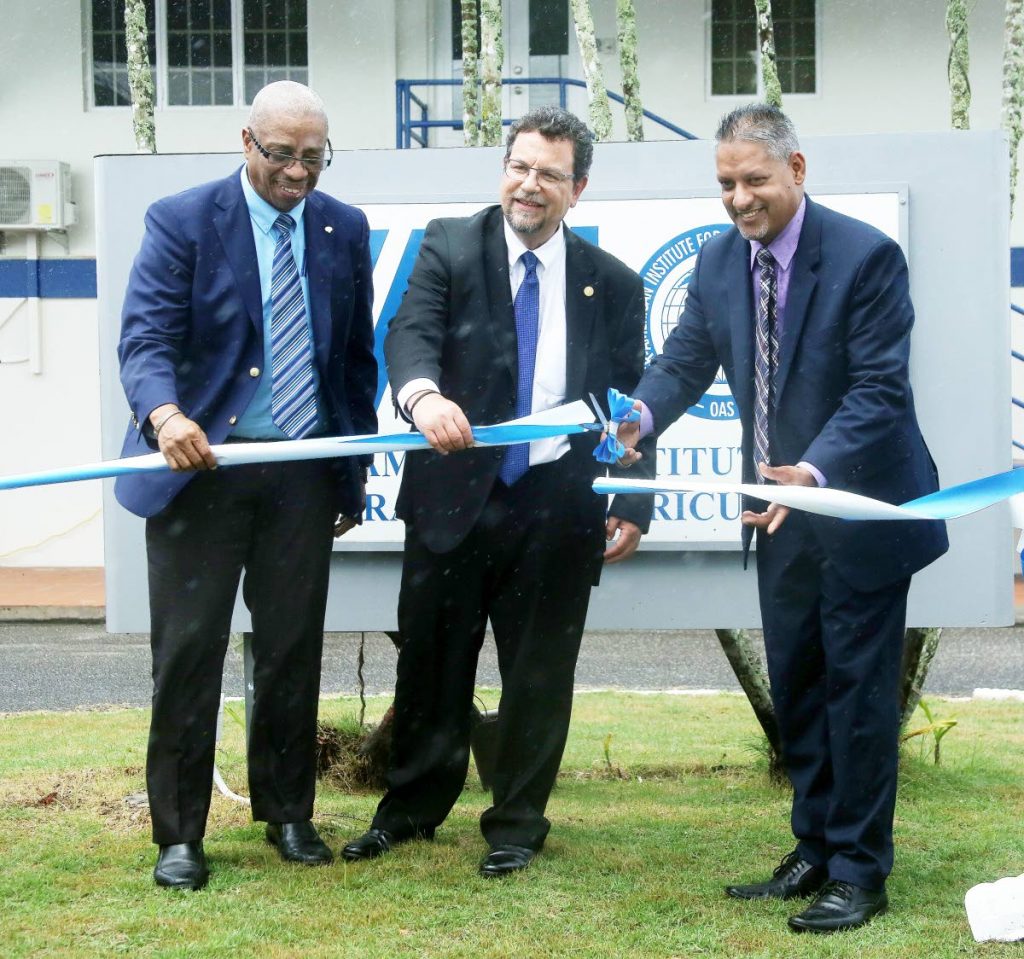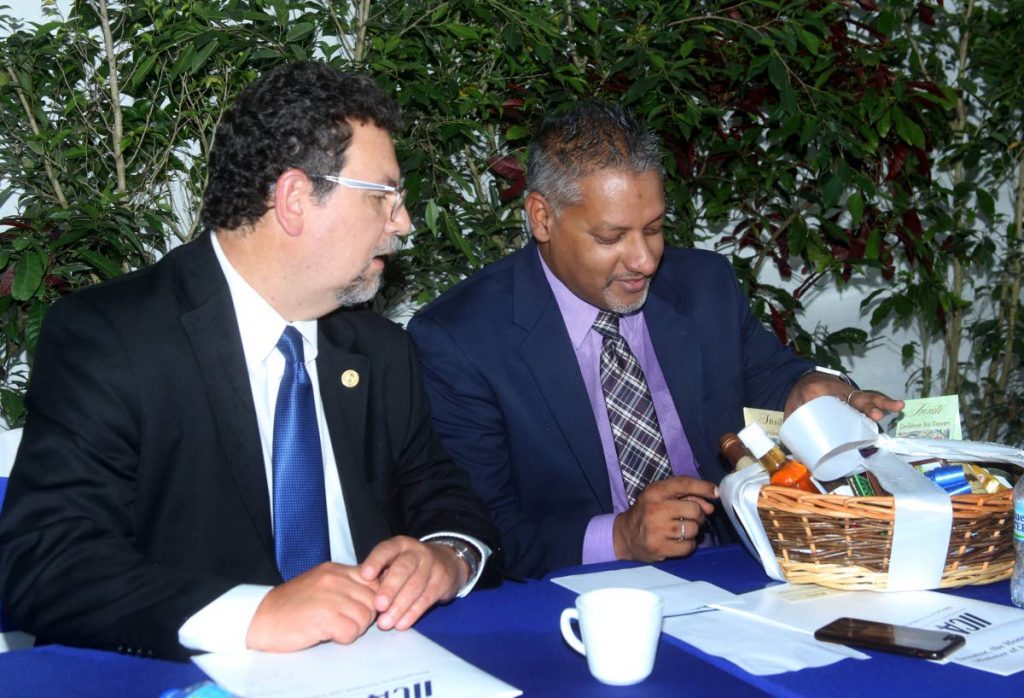Growth in agro-processing

The country may not have enough land for farming, but Government is doing what it can to boost productivity of what is under cultivation, and expand the agriculture industry.
This seemed to be the message from Agriculture Minister Clarence Rambharat at the opening of the headquarters for the Inter-American Institute for Cooperation in Agriculture (IICA) in Brechin Castle, Couva on Tuesday.
Lands are being regularised for farmers who have been squatting, the database of farmers is being digitised and, on the private sector front, enterprises like Nutramix Group of Companies are expanding, Rambharat said.
Prospects look good for Couva, said Rambharat, adding that as the minister in charge of state lands he is moving to improve business in the central community.
“The Prime Minister will soon turn the sod in this area to the tune of $80 million for a modern hatchery facility with the Nutramix Group of Companies,” he said.
Central Farms, he said, has also been approved by Cabinet for a $25 million modern facility for the production of Pekin duck. Soon the PM will turn the sod for the building of this facility in Couva.
“Khan's Organic Meats is almost close to being approved for a modern facility in organic foods. Khan's will be relocating from Kelly Village in Caroni to Couva,” Rambharat also disclosed.
These investments are signs of Government's move to introduce more livestock and agro-processing companies in Caroni, Rambharat said. He also spoke of a new housing project at Usine Ste Madeleine, under the the Housing Development Corporation, also reflecting growth in Caroni.
A week ago, the Prime Minister said agriculture will never be commercially viable because there is no land space, noting TT could not compete against larger farming nations. Not even TT's famed cocoa could generate substantial earnings like oil and gas has done for the economy, he observed.
"If it is exotic agriculture, 20,000 tonnes of cocoa, 5,000 containers of baigan... None of the economies of scale in there and none of the earnings from those areas, important as they may be, will be able to substitute effectively what we have become accustomed to which was given to us by oil and gas,” he said.
Agriculture received $780 million in this year's budget, however Rambharat remained optimistic about opportunities in agriculture.
Land tenure is one of the issues Rambharat said he wants to deal with in his fourth year as Minister of Agriculture. “Most of our farmers are squatters because most of farmers, and some of our best farmers, do not have tenure for land. If you read the PNM manifesto you will see of the 16 things they intended to do with half of them related to agriculture,” he said.
Since June, he said, Cabinet has dealt with 500 parcels of land and while this seems like a lot, the target is approximately 20,000. “Paperwork takes a long time and this has to be done to reach the target,” he said.
He noted the Chaguaramas Development Authority's records showed farmers have been squatting for as many as 60 years, and outlined Cabinet's approval to regularise 122.6 acres under the Ministry of Agriculture. Farmers in this area, he said, can now get their leases.
Saying he did not listen to the budget speeches, Rambharat lashed out at Opposition Leader Kamla Persad-Bissessar’s reply, saying she talked about cocoa and coconut water, coconut milk, coconut butter, but at no point did she mention land tenure.
"This tells about the disconnect that policymakers and leaders have had for more than six decades," Rambharat said. The Opposition Leader, he added, talked about agriculture and all the great things that could happen but left the matter of land unattended. "Which investor makes a long-term investment in equipment and infrastructure without having long-term vision rooted in a long-term lease?" he asked.
Saying the Government has made significant headway in dealing with Caroni (1975) Ltd, Rambharat said, "I don’t know how you could have 9,000 VSEP workers and make 7,000 beneficiaries of land."
Caroni workers received leases, the minister said, and had benefited from road and bridges.
"Food in this country is coming from those squatting in the East West Corridor, Guayaguayare, Matelot, Toco, and also in squatters in Moruga. There are no Paramin farmers with leases," Rambharat said. Government, he said, gave out leases to farmers in Orange Grove, Tacarigua.
Rambharat hit out at the Opposition, saying it talked about the rare soil available to grow crops but never focused on giving farmers the stability of tenure.

Tomorrow, he will launch a land card which will give holders and users of state lands electronic access to their files. The Agriculture Ministry has been able to convert 1,800 files so that each occupant will be given a barcode allowing them to update their matter and look at their status.
He touched on the claim that a barrel of oil costs less than a barrel of hot peppers.
"If we producing 30,000 barrels of oil for the day, then we produce 30,000 barrels of hot peppers? But the reality is we may have to use all the lands here and part of the sea to do that."
Cassava flour or green fig flour will not replace imported wheat flour any time soon, he said, and the Opposition talks about planting breadfruit and hot peppers, but that is a role for the private sector, not the Government.
"We have to create the right environment by giving tenure of lands for the purpose of primary production. If we are able to give incentive and support to agro-processors, if we are able to give the right support on intellectual properties, like we have done in Montserrat, if we are able to negotiate well in our international trading agreements, if we block – as we should – things from coming into the country which will unfairly compete, then we will be doing what a government supposed to do," he said.
A good policymaker, he said, crafts policies that survive changes in administration, and the country had had consistent changes in political administration.
IICA ready to support agro-development
Diego Montenegro, IICA’s director and special affairs coordinator, thanked Government for the support provided through the decision to lease the building in Couva for its headquarters.
“This positive move by the Government will provide the delegation with much needed stability and security in terms of the arrangements for office accommodation and should redound to the benefit to both IICA and stakeholders in the agricultural sector,” he said.
The opening of the office, Montenegro said, is also extremely timely as it coincides with IICA's 40th anniversary milestone. “Essentially, this provides the IICA, a unique opportunity to develop a new robust national technical cooperation agenda,” he said.
Over the 40-year period, the institute has adopted a technical cooperation model which has incorporated key elements that have yielded success.
“This is a dynamic model with flexibility that accommodates changes in technology, markets and trade at the international, hemispheric and regional levels,” he said. This model balances the need to engage and influence public policy and institutional arrangements with the need to engage directly with stakeholders and build their capacity for improved governance.
The IICA delegation in TT supports the government and public institutions in developing an environment conducive to investment in the sector through public policies, incentives, legislation, regulations and an enhanced capacity of public sector officials to deliver quality services to the agribusiness sector.
It also helps agencies engage stakeholders in farming communities and rural spaces, including women and youths, with a view to building their capacity to organise themselves to deliver goods and services which contribute to improved livelihoods.

Comments
"Growth in agro-processing"